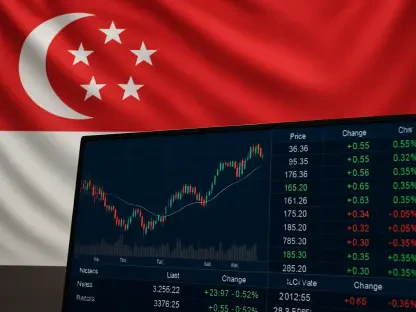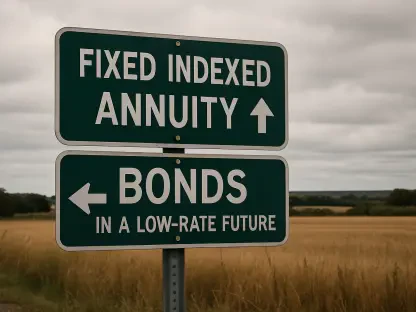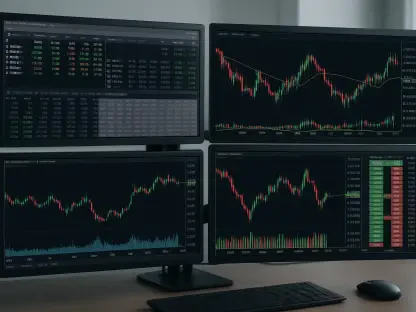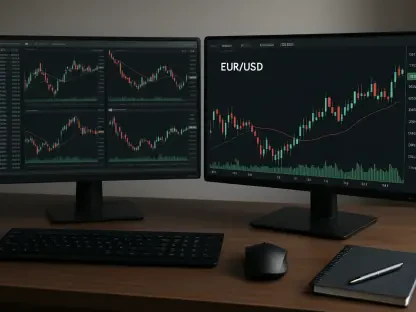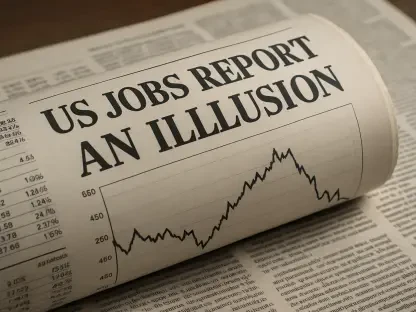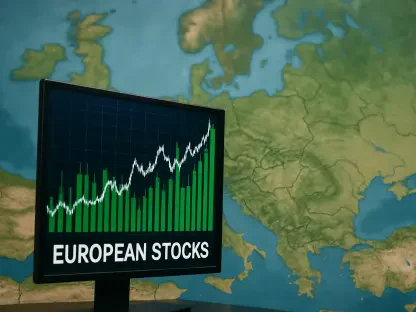In a financial landscape filled with contradictions, global investors find themselves wrestling with a perplexing dilemma staggering 91 percent of fund managers surveyed by Bank of America believe US stocks are overvalued at record levels, yet many continue to pour capital into the technology sector’s most dominant players, often referred to as the “Magnificent 7,” which include powerhouses like Nvidia and Microsoft. This striking behavior, captured in a recent survey of 169 participants managing $413 billion in assets, reveals a market caught between caution and conviction. Despite widespread concerns over inflated valuations, the allure of tech giants persists, driven by strong earnings and a belief in their long-term growth potential. This paradox sets the stage for a deeper exploration of investor sentiment, economic expectations, and the risks that could tip the balance in an already tense market environment.
Investor Sentiment and Market Dynamics
Navigating the Overvaluation Paradox
The Bank of America survey, conducted in early August, paints a vivid picture of a market grappling with conflicting signals, as a record number of fund managers express unease about the lofty valuations of US equities. Yet, in a twist of irony, 45 percent of respondents identified a “long Magnificent 7” position as the most crowded trade, signaling a remarkable rebound for these tech giants after a dip earlier in the year due to external pressures like tariff concerns. This resurgence, fueled by robust earnings reports, marks the first time since March that these stocks have reclaimed their spot at the top of investor preferences. The data suggests a deep-seated trust in the ability of these companies to deliver consistent growth, even as broader market valuations raise red flags. This dichotomy underscores a critical tension: while the majority acknowledges overpricing, the fear of missing out on tech-driven gains appears to outweigh the apprehension, pushing capital toward familiar, high-performing names.
Shifting Sentiment Toward Optimism
Beyond the fixation on tech stocks, the survey reveals a notable shift in overall investor sentiment, with optimism reaching its highest level in six months. A substantial 68 percent of participants anticipate a soft landing for the global economy over the next 12 months, a sharp departure from earlier fears of a hard landing, which only 5 percent now expect. This brighter outlook is mirrored in equity allocations, with global equities hitting their highest overweight position since February at a net 14 percent. However, caution lingers beneath the surface, as 16 percent of respondents remain underweight in US equities despite record market highs driven by strong corporate earnings and expectations of Federal Reserve rate cuts. This undercurrent of restraint highlights a market not fully convinced of its own bullishness, where optimism about economic stability coexists with selective hesitancy, particularly regarding the broader US stock landscape.
Economic Outlook and Emerging Risks
Balancing Confidence with Caution
As investor confidence in a soft economic landing grows, the survey also uncovers lingering concerns that could disrupt the current rally. Inflation worries are on the rise, with a net 18 percent of fund managers expecting higher global consumer price index readings, marking a three-month high. Key risks flagged include a potential trade war triggering a global recession, cited by 29 percent, and persistent inflation preventing Fed rate cuts, noted by 27 percent. Additionally, 20 percent worry about a disorderly rise in bond yields. These concerns contrast with the bullish allocations to tech stocks, suggesting that while many are betting on growth, the specter of external shocks keeps vigilance high. Market strategists, such as Bank of America’s Michael Hartnett, warn that the current rally could overheat into a bubble if monetary policies loosen further, adding another layer of complexity to an already intricate financial puzzle.
Exploring Alternative Opportunities and Threats
Beyond the focus on US markets, the survey points to emerging opportunities and diverse strategies among investors. A significant 49 percent of participants view emerging market equities as undervalued, the highest sentiment since early last year, hinting at a potential shift in focus toward regions offering better value. Meanwhile, varied market activities reflect differing approaches to risk—hedge funds sold a net $1 billion in US stocks in a recent week, while long-only investors purchased $4 billion, showcasing contrasting tactics. Other crowded trades, such as shorting the dollar at 23 percent and going long on gold at 12 percent, indicate hedging efforts against perceived vulnerabilities. Cash levels, sitting at 3.9 percent of total assets, also signal a potential sell-off risk per Bank of America metrics. These mixed signals illustrate a market at a crossroads, where confidence in certain sectors like tech is tempered by proactive measures to mitigate broader economic and policy-related threats.
Policy Expectations and Future Implications
Anticipating Federal Reserve Moves
Looking ahead, the survey captures significant expectations around monetary policy, particularly regarding the Federal Reserve’s next steps. A majority, 54 percent of respondents, anticipate that the successor to current Fed Chair Jerome Powell, whose term ends in May, will likely resort to measures like quantitative easing or yield curve control to manage US debt levels. This expectation of continued or enhanced intervention fuels a cautious optimism among investors, suggesting that policy support could act as a buffer against market volatility. Such anticipations are critical, as they underpin the willingness to maintain heavy investments in high-growth sectors like technology, despite overarching concerns about overvaluation. The belief in a safety net from policymakers appears to embolden risk-taking in specific areas, even as broader uncertainties loom on the horizon.
Reflecting on a Complex Financial Landscape
Reflecting on the insights gathered, it becomes evident that global fund managers are navigating a delicate balance between overvaluation fears and targeted bullishness in tech giants during this survey period. The confidence in a soft economic landing, coupled with strong earnings from leading firms, has driven substantial investments into the Magnificent 7, despite widespread acknowledgment of inflated US stock prices. At the same time, risks like inflation and trade tensions have prompted diversified strategies, including interest in undervalued emerging markets and alternative assets like gold. Moving forward, a prudent approach would involve closely monitoring policy developments at the Federal Reserve, as potential easing measures could either stabilize or overheat the market. Additionally, keeping an eye on global economic indicators and trade dynamics will be essential to anticipate shifts that could impact current investment trends. This nuanced snapshot of investor behavior highlights a pivotal moment in finance, urging a strategic blend of optimism and caution for future decision-making.


